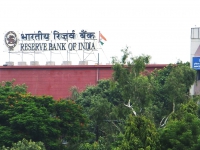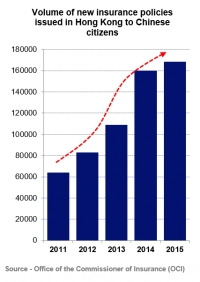Recently DCB Bank became the first bank in India to introduce Aadhar based authentication at its ATMs, starting with its branch in India’s commercial hub- Mumbai. Aadhar provides a 12 digit number to every Indian resident that serves as a proof of identity as well as proof of residence, with biometric scanners being used for authentication.
What’s the golden rule for investment? Don’t lose money. China’s middle class are thinking the same, and people are looking to P2P platforms for ‘safe and high return investment’ until the recent successive P2P company crisis from Jinlu to Zhongjin which has become a nightmare for the families who invested everything on them - the future of P2P products is uncertain.
In early March Citibank announced that it would sell-off its 20% stake in China Guangfa Bank to China Life insurance for USD 3 billion, almost five times more than what the US bank paid for the stake in 2006.
NPAs (non-performing assets) as a percentage of total banking credit in the Indian banking industry has increased to nearly 5% in 2015. This has essentially come from the public sector (state owned) banks (PSBs). 90% of the NPAs in the Indian banking industry are attributable to these banks.
Finance Minister Arun Jaitley presented the Union Budget for 2016-17 and while India’s high economic growth rate of 7.6% was a bright spot, banking related allocations grabbed the most attention.
“I don’t really care about what are the investment projects on the P2P platform or the borrowers’ details. My attention is more on the investment return, since most of the platform provide guaranteed return rate.”
With an estimated USD 1 trillion worth of capital outflows from Mainland China in 2015, it is clear that a subset of Chinese citizens would rather keep their money outside of China. Following the country’s turbulent stock market and depreciating Yuan, an estimated 100,000+ Mainland Chinese citizens have been venturing out to Hong Kong in order transfer more than the stipulated USD 50,000 outside of China through the means of insurance policies.
A recent announcement from China's central bank, the PBOC, now allows banks to remotely open bank accounts, which was previously not possible - there was at least a bank visit and some paperwork needed. The announcement allows customers to open new accounts via their mobile, which should increase competition significantly between the BAT and traditional banks.
Numerous Chinese media outlets are reporting on the latest moves by China's regulators to stop any new internet finance company registrations in China. The announcement is a bit vague as is expected from regulators, but indicates that no new fintech business license registrations will be allowed for the foreseeable future.
China’s Banking Regulation Commission (CBRC) has played with fire long enough, standing on the side and watching the story of online peer-to-peer lending unfold, as it started with a tremendous rise from 2013 to 2014 and to quickly turn into a machine of fraud and risk, potentially damaging countless individuals who were naïve enough to trust this system.
The 12th of December marked the official announcement by China UnionPay (CUP) of the launch of Cloud QuickPass, a mobile payment solutionbased on NFC (Near Field Communication) technology. Tests had been ongoing since May at franchises like McDonald’s, with the backing of the Industrial and Commercial Bank of China (ICBC) and builds on the existing QuickPass NFC technology deployed in many of the current CUP point-of-sale terminals around China.
On November 18th, Baidu announced that it was finalising its private bank plans and would be setting up a banking venture with China Citic bank called Baixin. This was the last of the 3 BAT (Baidu, Alibaba, Tencent) to setup a private bank and was widely expected, although potentially a bit later than originally thought.
China officially dropped its one-child policy by announcing that all married couples would be allowed to have two children. The move had an impact on markets at home and abroad. Shares in companies that make baby products such as diapers, prams and infant formula were up on the day of announcement while shares of popular contraception brand fell. This economic wave travelled as far as New Zealand where the currency of the dairy exporting country surged. The market reacts for a good reason. It is estimated that the relaxed controls would result in an extra 3 million to 6 million babies born annually in the five-year period starting in 2017.
Chinese largest online travel company Ctrip.com International Ltd announced a 45% tie-up with its competition Qunar Cayman Islands Ltd to create an absolute dominant position for China’s fiercely competitive online travel market.
The US ATM manufacturer Diebold is discussing a potential takeover with Wincor Nixdorf, a German ATM manufacturer. Wincor Nixdorf was offered approximately EUR 1.74 billion at EUR 52.50 per share, a price which includes a 30% premium over the stock price on the date of the offering.
The two companies are number 2 and 3 globally, but the ATM market is slowing down, as mature markets are already saturated and sales in the emerging markets are quickly reaching their peak. The industry is also feeling pressure from virtual payments as the shift away from cash and bank cards is happening across the world.
Two days after the global transaction service provider SWIFT reported that in August the yuan overtook the Japanese yen to be the world's fourth-largest payment currency, accounting for 2.79% of the global market, yesterday the PBOC launched the Cross-Border Interbank Payment System (CIPS) in Shanghai.
Earlier this week, Alibaba announced it would be investing an additional estimated USD680 million in Paytm, India’s largest mobile payment platform and part of One97 Communications. The investment ups Alibaba's overall ownership to around 40% and shows the e-commerce giant's ambitions to further help develop the mobile commerce and payment industry in India. The money will primarily be used to strengthen the technological platform, customer acquisition and entry into new categories.
With growing national security concerns surrounding imported western network equipment, China’s intensions have been to utilise homegrown network equipment to support its IT infrastructure. Tech giants like Cisco have been displaced to the sidelines with shrinking market share and deflating revenues in the Chinese market. It seems Cisco, who was once critical to the design and construction of China’s internet revolution in the 90’s will be marginalised if it does not take action to boost its sales in China.
If you've ever been to China, you know how atrocious the mobile phone service can be. Previously, you could use any of a number of carriers...as long as it was China Mobile. You could move your number to a different carrier...as long as you had a different number. Users really had no choice as the market was controlled by the government and the 3 main state-owned carriers. Xiaomi is one of eight firms that will be trying to change this.
As a national idol and a self-made billionaire in China, Jack Ma has already shown how he could change the e-commerce industry. He is now creating an internet entertainment empire with Alibaba's previous expansion into music and movies, and now sports.
A cinema in Beijing recently announced that it had become a 'smart movie theatre' by allowing moviegoers to book tickets on their phone which can then be read by a machine a the theatre. Not a completely innovative idea, but considering Alibaba is involved, this could be a big change in the way people consume the medium.
China’s economy is changing. Consumers have taken to e-commerce in a big way and have clicked and shopped their way to make China's e-commerce industry the biggest in the world. A key enabler has been financial reform, which has let the online and mobile payments industry grow and develop. Yet with the regulations of the past month, you'd be forgiven for scratching your head and wondering what the government had in mind...
Big data continues to be big in China's financial industry as China's Qihoo 360 moves into the segment with a data-driven finance product of its own.
Earlier this week, Finance Asia reported that Yang Kaishen, CEO and Chair of the Industrial Commercial Bank of China stated that recent moves by regulators would be good for innovation. Wait...so the chair of one of the biggest SOEs in the country is in favor of legislation that cuts off the legs of innovation? Well, I'll be...
There's something to be said for the refreshing marketing on Ant Financial's new online wealth management app "Ant Fortune." Whether or not it will actually make a fortune for users is a bit unclear, but you can be sure Alibaba will do well out of it.
Online loans, payments, and banking - nearly every segment of the banking industry has been affected by China's rapidly growing internet finance industry. For the past two years, it has done so without much regulatory oversight or intervention. That looks like it will change soon.
Kapronasia will be presenting at Oracle's Digital Bootcamp on August 4th in Singapore. As a sneak peak of what Zennon will be talking about, here are a couple of intro thoughts on Digital Banking in China
Finger pointing on global stockmarket crashes continues unabated as The China Securities Regulatory Commission starts an investigation into Alibaba invested Hundsun Technology.
Kapronasia is pleased to be a media partner for the Emerging Asia E-Commerce & Supply Chain Conference to be held in Bangkok on July 29th-30th, 2015. The event continues to be one of the key events across the region and is this year again in Thailand, where payments and e-commerce remain a key focus for the country going forward.
The big data e-commerce powerhouse Alibaba is now eager to leverage their data on millions of users and transactions in new projects. This time they have followed their formidable rival JD.com by moving into the crowdfunding area to extend financing to SMEs.
More...
As Italy’s economy is struggling to find growth opportunities, well-off Chinese immigrants and businessmen seem to do well in the country. Chinese individuals are reported to be buying everything from fancy cars to real estate and are opening small businesses. But according to local government, their prosperity was not reflected in the local tax records to the extent the government expected it to be.
Since Beijing became more cautious on the use of foreign technology in the banking sector, Chinese banks have been intensely trying to figure out what to do next. One bank is not waiting and it's no surprise that the soon-to-launched Alibaba-affiliated internet private bank MYbank is moving in lockstep with the government policy as well as develop its own long-term technology strategy. MYbank announced it will be using an in-house cloud computing system instead of products from IBM, Oracle and EMC (IOE).
A whole generation of ordinary Chinese have been neglected in terms of wealth management and banking with high minimum investment thresholds or VIP-only products preventing only a select few from getting access to traditional wealth management products. Alibaba and Tencent have brought innovative internet finance based services such as Tenpay or Alipay to the market and have further opened up wealth management to an entire new segment of the market with 'mass-market' wealth management products. China’s e-commerce powerhouse Alibaba now is after banking industry.
A new partnership between CreditEase and Wellington has changed the rules with an incredibly easy way for the increasingly wealthy middle-class to invest abroad.









